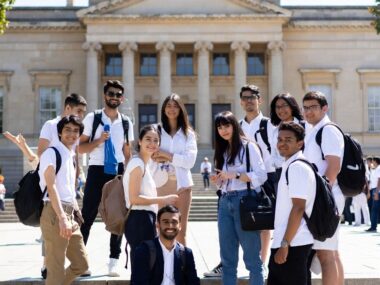Ask any international student what surprised them most about studying abroad, and money will probably be near the top of the list. Tuition is just one part of the picture. Rent, groceries, transport, and small daily expenses can quickly stretch a student budget. That’s why more people are now looking at a mix of scholarships and student jobs instead of relying on just one source of support.
A scholarship can take a huge weight off your shoulders, especially when it covers tuition. But once you actually arrive in a new country, you realize there are plenty of other costs that pop up along the way. Having a part-time job, even for a few hours a week, often makes everyday life less stressful and gives students more breathing room financially.
Beyond the money, balancing scholarships and student jobs also changes the study-abroad experience in a good way. Working while studying helps students build confidence, improve communication skills, and understand how things work in their new environment. Those lessons often stay with them long after graduation.
Many universities now understand this reality. Instead of expecting students to survive on funding alone, they create flexible work options and support services that make it easier to handle both academics and part-time work. When managed well, this combination doesn’t distract from studies, it actually helps students feel more stable and focused.
Understanding Scholarships and Student Jobs Abroad
Understanding scholarships and student jobs abroad is the first step to building a successful academic journey. In 2025, more students are realizing how both opportunities can work hand in hand to support their education and finances. Studying overseas can be a dream, but it comes with expenses that need careful planning. That’s why knowing how scholarships and student jobs function makes a big difference.
To begin with, scholarships abroad are financial awards given to students based on merit, need, or special achievements. They help reduce the high cost of studying in foreign countries. Some scholarships cover full tuition, accommodation, and even travel, while others pay a partial amount. Whether funded by universities, governments, or private organizations, scholarships ease the financial stress of international education.
On the other hand, student jobs abroad are part-time opportunities that allow students to work while studying. Many universities and governments permit international students to work a certain number of hours per week. These jobs can be on-campus, like library or research assistant roles, or off-campus, such as working in cafés, shops, or tech firms. Each role offers not just income but also valuable real-world experience.
Combining both scholarships and student jobs abroad brings powerful benefits. Scholarships handle tuition and major academic expenses, while jobs cover personal needs and emergencies. Together, they provide balance. Also, students stay focused on learning while still maintaining financial independence.
Moreover, working abroad while on scholarship helps students develop essential soft skills. They learn teamwork, punctuality, and problem-solving, skills that employers value globally. This blend of study and work experience often makes graduates more competitive in the global job market.
In essence, understanding scholarships and student jobs abroad is about more than managing money. It’s about building a solid foundation for both academic and professional growth. When students use both opportunities wisely, they don’t just survive abroad, they thrive.
Benefits of Combining Scholarships and Student Jobs
Combining scholarships and student jobs abroad in 2025 is one of the smartest moves any international student can make. Studying in a foreign country is exciting, but it can also be expensive. When you pair scholarships with part-time work, you create a balance that makes your journey easier, more rewarding, and financially stable.
To begin with, scholarships reduce a huge part of your financial burden. They often cover tuition, accommodation, and sometimes even travel costs. This gives you peace of mind and allows you to focus more on your studies instead of worrying about bills. At the same time, having a student job abroad helps you handle daily expenses such as food, books, or transportation. Together, they make your stay more comfortable and sustainable.
Beyond finances, this combination teaches you real-world lessons that no classroom can offer. Working while studying improves your time management skills. You learn how to balance academics with job responsibilities, a skill that employers truly value. It also helps you develop self-discipline and resilience, which are important qualities for career growth.
Equally important, student jobs abroad help you gain practical experience in diverse work environments. You get to meet people from different cultures, build networks, and understand workplace ethics in your host country. These connections and experiences often open doors to better job opportunities after graduation.
Moreover, balancing scholarships and student jobs builds independence. You no longer rely solely on financial aid or family support. You become responsible for your own needs, which boosts your confidence and maturity. Many students even say this balance helped them feel more prepared for life after school.
In simple terms, combining scholarships and student jobs abroad offers both financial stability and personal growth. It’s a smart strategy that allows you to study without stress, gain work experience, and prepare for global opportunities. When done right, it turns your study abroad experience into a powerful foundation for success.
How to Find Student Jobs While on Scholarship
Finding student jobs while on scholarship abroad can feel challenging at first, but it’s completely achievable with the right approach. In 2025, international students have more resources and online platforms to make the search faster and easier. The key is knowing where to look, what kind of jobs suit your schedule, and how to stay within legal work limits.
To start with, most universities abroad offer on-campus job opportunities for scholarship students. These include roles like library assistant, lab helper, or research aide. Such jobs are convenient because they are flexible and usually close to your class schedule. You can apply directly through your school’s career center or student employment portal. Many schools also post openings on their official websites.
Outside the campus, several trusted websites list part-time student jobs abroad for international students. Platforms like Indeed, LinkedIn, Glassdoor, and local job boards are excellent places to begin. Some countries even have government-run websites dedicated to student employment. These platforms make it easy to filter jobs that match your location, hours, and field of interest.
Networking also plays a powerful role in finding student jobs. Talking to fellow scholarship students, professors, or international student offices can lead to great opportunities. They often share job openings or refer students to employers who understand academic schedules. Social media groups for international students can also be very useful for quick job updates.
When applying for student jobs while on scholarship, it’s crucial to check visa regulations in your host country. Each country sets specific rules on how many hours international students can work per week. For example, many allow up to 20 hours during the school term and full-time during breaks. Following these rules keeps your visa status safe and ensures a stress-free experience abroad.
In addition, look for jobs that complement your studies. For instance, a student studying computer science could take a part-time tech assistant role, while a business student might work in retail or marketing. Choosing relevant jobs helps you gain experience in your field while earning income.
To sum it up, finding student jobs while on scholarship abroad is about strategy and awareness. Use trusted platforms, follow legal guidelines, and seek flexible roles that fit your schedule. With persistence and smart choices, you can enjoy financial stability and professional growth while studying overseas.
Time Management Tips for Students Balancing Work and Study
Balancing work and study abroad while on a scholarship is one of the biggest challenges international students face. The desire to earn extra money and still maintain good grades can feel overwhelming. Yet, with the right time management strategies, it’s possible to excel in both areas without burning out.
To begin, create a weekly schedule that clearly separates study hours, work shifts, and rest time. Having a structured plan helps you stay organized and focused. Many scholarship students abroad use digital planners or apps like Google Calendar or Notion to track their daily tasks. This prevents missed deadlines and reduces last-minute stress.
In addition, set clear priorities. Identify the most important tasks each day and handle them first. For example, if you have an assignment due soon, complete it before your work shift. This approach ensures your studies remain your top focus while still giving time to your job responsibilities.
It’s also helpful to choose flexible student jobs abroad that align with your academic schedule. On-campus roles, remote internships, or research assistant positions are great options. They allow you to earn income without conflicting with class hours. Discuss your schedule with your employer early, so they understand your academic commitments.
Equally important, learn to say no when necessary. Many students overcommit because they fear losing opportunities. Yet, accepting too many tasks can affect your performance both at school and work. Keep a balance that protects your mental health and academic progress.
Moreover, use your free time wisely. Short breaks between classes can be used for quick study reviews, reading, or planning the next day. Staying consistent with small efforts helps you keep up without feeling pressured during exams.
Don’t forget to take care of your health. A well-rested and focused mind performs better. Try to get enough sleep, eat healthy, and take short walks. Working and studying abroad can be demanding, but your health determines how well you can handle both.
In summary, successful time management for scholarship students abroad is about planning, prioritizing, and protecting your energy. When you learn to balance your hours smartly, you gain both academic success and valuable work experience. The key is consistency. Small, disciplined habits lead to big results in the long run.
Common Mistakes to Avoid When Working on Scholarship
Balancing a student job and scholarship abroad can be exciting and rewarding, but it also comes with hidden challenges. Many international students unknowingly make mistakes that affect their performance, health, and even their funding. Understanding these mistakes early can help you stay on track, maintain balance, and enjoy your study experience abroad.
One of the biggest mistakes is taking on too many work hours. Many students think more hours mean more income, but this often leads to exhaustion. Working too much can cause fatigue, low concentration, and even poor grades. It’s better to find a balance where you earn enough but still have energy for your studies. Keeping your schedule light during exam seasons can also make a big difference.
Another common error is ignoring scholarship conditions. Some scholarships have rules about how many hours students can work weekly. Violating these rules can lead to losing your funding or facing academic penalties. It’s always wise to read your scholarship policy carefully and speak with your advisor if you’re unsure about the limits.
Also, poor time management often causes unnecessary stress. Without a clear plan, students rush assignments, miss classes, or arrive late for work. Creating a routine where study, work, and rest are balanced helps you stay organized. Using digital planners or reminders can keep your schedule in check and your mind focused.
Moreover, neglecting self-care is a silent but serious mistake. Working and studying abroad demand energy, and burnout can sneak in quietly. Students who skip meals, stay up late, or isolate themselves often struggle emotionally. Taking short breaks, eating well, and sleeping enough can help you stay productive and mentally strong.
In addition, failing to communicate with employers or supervisors can create avoidable tension. Be open about your study commitments and discuss your work availability early. Most employers understand the importance of education and can adjust schedules when you’re transparent.
Another mistake many students make is spending earnings carelessly. Earning money abroad can be exciting, but without budgeting, it disappears quickly. Setting aside part of your income for savings or emergencies gives financial stability. It also ensures you don’t rely too heavily on future paychecks.
Lastly, not asking for help when overwhelmed can make things worse. Many students stay silent when struggling to balance work and academics. Reaching out to a mentor, counselor, or fellow student can help you regain balance and perspective. Support systems exist to make your journey easier.
In essence, succeeding as a scholarship student with a part-time job abroad requires wisdom, discipline, and balance. Avoiding these common mistakes helps you grow, stay healthy, and keep your scholarship intact. When you learn to manage your time, energy, and money wisely, you’ll thrive both in class and beyond.
Conclusion
Combining scholarships and student jobs abroad is more than just a financial strategy. It’s a foundation for long-term success. For many international students, this combination doesn’t only lighten financial stress. It also shapes their character, builds independence, and prepares them for global opportunities.
When you manage both opportunities wisely, you gain more than money or grades. You learn discipline, time management, and real-world problem-solving, which are all valuable life skills. These lessons extend far beyond the classroom and influence your future career. Many successful graduates trace their growth to the balance they maintained during their student years abroad.
Working part-time while studying on scholarship also helps you build professional experience early. Even simple campus jobs can teach teamwork, communication, and leadership. Employers often value candidates who’ve handled work and study together because it shows determination and responsibility. With each job experience, you’re not just earning income. You’re also setting yourself up for a solid career path.
In addition, scholarships provide a sense of academic focus and motivation. They remind you that someone believes in your potential. This confidence pushes you to aim higher and make the most of every opportunity. When paired with part-time work, it strengthens your financial freedom and allows you to explore new environments without worry.
Another key benefit is personal growth. Living and working abroad forces you to adapt, connect, and communicate with people from different backgrounds. This exposure shapes your worldview and helps you develop emotional maturity. Balancing studies and work teaches resilience, something every professional needs in today’s fast-changing world.
On the other hand, you must remember to set healthy boundaries. Success comes from balance, not burnout. Ensure you rest, connect with friends, and take care of your mental health. A stable future starts with a stable mind and body. Managing your time and energy effectively will make every effort worthwhile.
Beyond finances and grades, this balance opens doors to greater opportunities. Some students turn part-time jobs into full-time offers after graduation. Others gain valuable networks that guide them toward global careers. The blend of academic achievement and work experience becomes a strong tool for future success.
To sum it all up, scholarships and student jobs abroad are more than stepping stones, they are bridges to a fulfilling and secure future. By learning how to balance them smartly, you not only survive your student years but thrive in them. With focus, discipline, and a growth mindset, you can build a life that reflects both financial stability and academic excellence.






